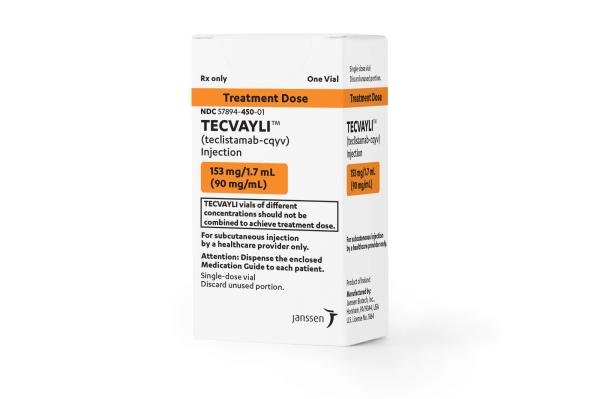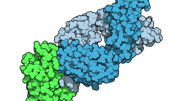Teclistamab-cqyv is approved by FDA for relapsed or refractory multiple myeloma
November 2022: The first bispecific B-cell maturation antigen (BCMA)-directed CD3 T-cell engager, teclistamab-cqyv (Tecvayli, Janssen Biotech, Inc.), was given accelerated approval by the Food and Drug Administration for adult patients with relapsed or refractory multiple myeloma who had previously received at least four lines of therapy, including a proteasome inhibitor, an immunomodulatory drug, and an anti-CD38
MajesTEC-1 (NCT03145181; NCT04557098), a single-arm, multi-cohort, open-label, multi-center trial, tested teclistamab-cqyv. The effectiveness population comprised of 110 patients who had not previously received BCMA-targeted therapy and had previously received at least three medications, such as a proteasome inhibitor, an immunomodulatory drug, and an anti-CD38 monoclonal antibody.
Overall response rate (ORR), as evaluated by the Independent Review Committee assessment using International Myeloma Working Group 2016 criteria, served as the primary efficacy outcome measure. The ORR (95% CI: 52.1, 70.9) was 61.8%. The estimated duration of response (DOR) rate was 90.6% (95% CI: 80.3%, 95.7%) at 6 months and 66.5% (95% CI: 38.8%, 83.9%) at 9 months among respondents with a median follow-up of 7.4 months.
A Boxed Warning for neurologic damage, including immunological effector cell-associated neurotoxicity, and life-threatening or deadly cytokine release syndrome (CRS) is included in the prescribing information for teclistamab-cqyv (ICANS). Patients who received the indicated dose of teclistamab-cqyv experienced CRS in 72% of cases, neurologic damage in 57%, and ICANS in 6% of cases. Grade 3 CRS occurred in 0.6% of individuals, while 2.4% of patients experienced Grade 3 or 4 neurologic damage.
The only way to obtain teclistamab-cqyv is through a restricted programme run under a Risk Evaluation and Mitigation Strategy (REMS), known as the Tecvayli REMS, due to the dangers of CRS and neurologic toxicity, including ICANS.
The 165 patients in the safety population had pyrexia, CRS, musculoskeletal pain, injection site response, exhaustion, upper respiratory tract infection, nausea, headache, pneumonia, and diarrhoea as the most frequent side events (20%). A drop in lymphocytes, a decrease in neutrophils, a decrease in white blood cells, a decrease in haemoglobin, and a decrease in platelets were the most prevalent laboratory abnormalities in Grades 3 to 4 (20%).
Teclistemab-cqyv is administered subcutaneously in doses of 0.06 mg/kg on Day 1, 0.3 mg/kg on Day 4, 1.5 mg/kg on Day 7, and then 1.5 mg/kg each weekly until disease progression or intolerable toxicity.
View full prescribing information for Tecvayli.
Dr. Nishant Mittal is a highly accomplished researcher with over 13 years of experience in the fields of cardiovascular biology and cancer research. His career is marked by significant contributions to stem cell biology, developmental biology, and innovative research techniques.
Research Highlights
Dr. Mittal's research has focused on several key areas:
1) Cardiovascular Development and Regeneration: He studied coronary vessel development and regeneration using zebrafish models1.
2) Cancer Biology: At Dartmouth College, he developed zebrafish models for studying tumor heterogeneity and clonal evolution in pancreatic cancer.
3) Developmental Biology: His doctoral work at Keio University involved identifying and characterizing medaka fish mutants with cardiovascular defects.
4) Stem Cell Research: He investigated the effects of folic acid on mouse embryonic stem cells and worked on cryopreservation techniques for hematopoietic stem cells.
Publications and Presentations
Dr. Mittal has authored several peer-reviewed publications in reputable journals such as Scientific Reports, Cardiovascular Research, and Disease Models & Mechanisms1. He has also presented his research at numerous international conferences, including the Stanford-Weill Cornell Cardiovascular Research Symposium and the Weinstein Cardiovascular Development Conference.
In summary, Dr. Nishant Mittal is a dedicated and accomplished researcher with a strong track record in cardiovascular and cancer biology, demonstrating expertise in various model systems and a commitment to advancing scientific knowledge through innovative research approaches.
- Comments Closed
- November 17th, 2022





Janssen Biotech, MajesTEC-1, NCT03145181, teclistamab-cqyv, Tecvayli
CancerFax is the most trusted online platform dedicated to connecting individuals facing advanced-stage cancer with groundbreaking cell therapies.
Send your medical reports and get a free analysis.
🌟 Join us in the fight against cancer! 🌟
Привет,
CancerFax — это самая надежная онлайн-платформа, призванная предоставить людям, столкнувшимся с раком на поздних стадиях, доступ к революционным клеточным методам лечения.
Отправьте свои медицинские заключения и получите бесплатный анализ.
🌟 Присоединяйтесь к нам в борьбе с раком! 🌟